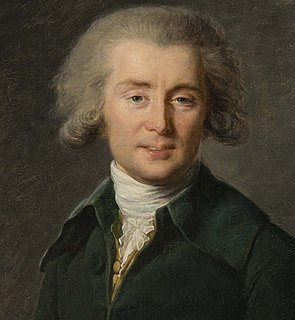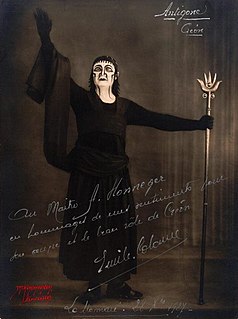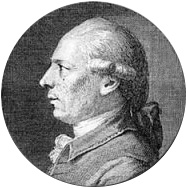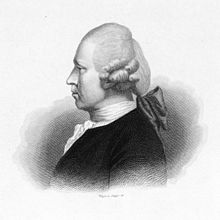
I quatro rusteghi is a comic opera in three acts, music by Ermanno Wolf-Ferrari to a libretto by Luigi Sugana and Giuseppe Pizzolato based on Carlo Goldoni's 18th-century play I rusteghi. The opera is written in Venetian dialect, hence "quatro" instead of "quattro".

La clemenza di Tito, K. 621, is an opera seria in two acts composed by Wolfgang Amadeus Mozart to an Italian libretto by Caterino Mazzolà, after Pietro Metastasio. It was started after most of Die Zauberflöte, the last of Mozart's principal operas, had already been written. The work premiered on 6 September 1791 at the Estates Theatre in Prague.

L'abandon d'Ariane, Op. 98, is an opera in one act by Darius Milhaud to a French libretto by Henri Hoppenot, based on Greek mythology. It is the second of three Opéras-Minutes (Mini-Operas) that Milhaud composed. It came between L'Enlèvement d'Europe, Op. 94, and La Délivrance de Thésée, Op. 99, with librettos also by Henri Hoppenot (1891–1977), a French diplomat. The three operas together last about twenty-seven minutes.

Le cinesi is an opera in one act, with music composed by Christoph Willibald Gluck. The Italian-language libretto was by Pietro Metastasio, and he described it as a componimento drammatico. This libretto had first been set by Antonio Caldara in 1735. For Gluck's rework, the piece is often considered as an azione teatrale, even though Metastasio and the composer both retained the original designation. The work was first performed for the Austrian royal family at the Schloss Hof on 24 September 1754, on the occasion of the visit of the Empress Maria Theresa to the household of Saxe-Hildburghausen.
La fausse esclave is an opéra comique in one act by Christoph Willibald Gluck. Its French-language libretto based on Louis Anseaume and Pierre-Augustin Lefèvre de Marcouville's libretto for La fausse aventurière, an opéra comique by Jean-Louis Laruette. It was first performed on 8 January 1758 at the Burgtheater in Vienna. The full score is lost, but a keyboard version is extant.

Le Huron is a French opéra comique in two acts by André Grétry. The libretto is by Jean-François Marmontel based on the story L'Ingénu (1767) by Voltaire. It was the composer's first big success with Parisian audiences.

La fiera di Venezia is a three-act opera buffa, described as a commedia per musica, by Antonio Salieri, set to an Italian libretto by Giovanni Gastone Boccherini.

Daphnis et Chloé is a one-act opérette by Jacques Offenbach. The libretto was by Clairville and Jules Cordier, based on the story of Daphnis and Chloe. The origin is the novel by Longus adapted as a play at the Théâtre du Vaudeville in 1849.
Les âges or Le ballet des âges is an opéra-ballet in a prologue and three acts by the French composer André Campra. The libretto is by Louis Fuzelier. It was first performed by the Académie royale de musique at the Théâtre du Palais-Royal on 9 October 1718.

Le peintre amoureux de son modèle is an opéra comique in two acts by the composer Egidio Duni with a libretto by Louis Anseaume. It was first performed at the Théâtre de la Foire Saint-Laurent in Paris on 26 July 1757. The Italian Duni had been working at the court of Parma, where French culture was highly fashionable, and travelled to Paris to see the premiere of his opera. He remained in France for the rest of his career. Le peintre marked an important stage in the development of opéra comique, since its musical numbers were almost entirely original music, whereas previous opéras comiques employed either popular vaudevilles or ariettes appropriated from other works.

L'école de la jeunesse ou Le Barnevelt françois is an opéra comique in three acts by the composer Egidio Duni. The libretto, by Louis Anseaume, is based on George Lillo's play The London Merchant or The History of George Barnwell (1731). The opera was first performed at the Opéra-Comique in Paris on 24 January 1765.

Lisuart und Dariolette, oder Die Frage und die Antwort is a 'romantisch-comische Oper' by the German composer Johann Adam Hiller.
La falena is a leggenda or opera in three acts by composer Antonio Smareglia with an Italian libretto by Silvio Benco. The opera premiered at the Teatro Rossini in Venice on 6 September 1897.

Antigone is an opera in three acts by Arthur Honegger to a French libretto by Jean Cocteau based on the tragedy Antigone by Sophocles. Honegger composed the opera between 1924 and 1927. It premiered on 28 December 1927 at the Théâtre Royal de la Monnaie with sets designed by Pablo Picasso and costumes by Coco Chanel.

Medea is an opera in three acts composed by Giovanni Pacini to a libretto by Benedetto Castiglia. It premiered on 28 November 1843 at the Teatro Carolino in Palermo, conducted by the composer with Geltrude Bortolotti in the title role. The libretto is based on the plays Medea by Euripides and Médée by Pierre Corneille.

Issé is an operatic pastorale héroïque by the French composer André Cardinal Destouches. Initially it was in three acts. The definitive revised version consists of a prologue and five acts. The libretto was by Antoine Houdar de la Motte. Although Destouches was only 25 at the time of its premiere, it is considered his best score.

Ernelinde, princesse de Norvège is a three-act operatic tragédie lyrique, by the French composer François-André Danican Philidor. The libretto was by Antoine-Alexandre-Henri Poinsinet, after Francesco Silvani's opera libretto La fede tradita, e vendicata.
Il trionfo di Clelia, Wq. 31, is an opera composed by Christoph Willibald Gluck. It takes the form of a dramma per musica in three acts. The Italian-language libretto by Pietro Metastasio is based on several semi-legendary narratives concerning the founding of the Roman Republic. The opera premiered on 14 May 1763 at the Teatro Comunale di Bologna. Although rarely performed since then, it was revived in London in 2012 at the Royal Opera House's Linbury Studio.

Claudio Guastalla was an Italian opera librettist.














